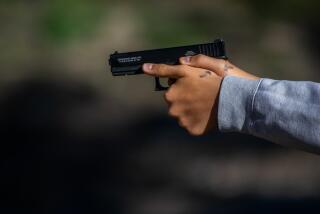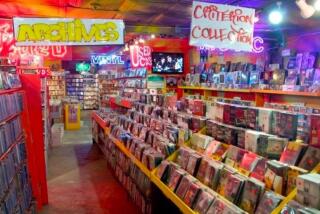A Moment of Terror in South L.A.
- Share via
Century Liquor was closed. And that figured. This was Friday morning, the day after Century Liquor had become the latest venue in the war between the Koreans and the blacks. Steel gates had been pulled across the windows and Century Liquor was definitely down for the day.
A year ago, things would have been different. One shooting in South-Central, one man wounded, would not close a liquor store. But now the war was on, the news vans would be coming all day, and etiquette dictated that operations cease. For a while.
You can get into arguments over the precise number of shootings in this particular war. Some say five. Some say 18. There have been enough that the episodes start to blend.
But surely the shooting at Century Liquor ranks as the most pathetic. No one intended a robbery. No one started a shoving match. The whole thing, in fact, evolved like a bad joke.
It seems that a group of men and women had gathered on the corner of 54th Street and Arlington. This was Thursday at 10 p.m. and a few beers were being consumed. But otherwise a tame evening.
Suddenly, the crowd heard a shotgun blast. The flash of the muzzle could be seen coming from the inside of a car. And the car was headed toward them.
The crowd panicked. They ran for the nearest refuge, which happened to be the front door of Century Liquor.
Meanwhile, inside the store, owner Haeng Kim was just leaving the back-room toilet. He also heard the shotgun reports. We can safely assume, I think, that Kim’s tension level increased at that point.
As he walked from the back room into the store, pandemonium erupted. The front door seemed to explode and through it charged a yelling, screaming crowd. Display cases were knocked over. The human wave advanced toward the counter.
Kim, thinking fast, linked the shotgun blasts to this crowd. They were the shooters! Believing his store was being attacked commando-style, he reached for his pistol and started to fire.
In that instant, the crowd found itself caught in a trap. The car was shooting at them from the street. And owner Kim was shooting at them from the counter. Everyone ducked, but not fast enough. Kim hit one man in the stomach, wounding him, and he was carted off to the hospital.
So here’s the question: What do we make of this? Did owner Kim shoot into the crowd because he hates and fears black people? Does Century Liquor become the next boycott target in the war?
One general in this war lost no time in casting his vote. Brotherhood Crusade leader Danny Bakewell, cheerleader of the first boycott, characterized the shooting as “horrible, terrible,” and went on to say this: “There are merchants operating in our community who see a gang member, or a life that is not worth valuing, behind the face of every black man, woman and child who goes into his store.”
Bakewell is arguing that Kim shot into the crowd because he could only interpret the rush through the door as an attack. He is inferring that if the onrushing crowd had been white, or Korean, Kim would not have been so quick on the trigger.
Or conversely--and more to Bakewell’s liking--if the owner had been a black man, he would have deferred judgment on the pandemonium long enough to save a man from a bullet.
You know, Bakewell does have a point. A small one. Is there anyone who does not regard other races with more suspicion than his own?
But so what? We’ve lived with this reality for about 200 years now without the necessity of segregating our commercial districts.
And, in the end, Bakewell’s point is overwhelmed by the larger truth of the shooting. It’s this: The Century Liquor shooting was not, in fact, about race. It was about a neighborhood devouring its own.
There was the crowd fleeing its own street in terror, only to find the street offered no place to run.
And a lone store owner thoroughly frightened by the real dangers of his position. A man so acclimated to fear that his pistol was kept close at all times.
This is not to say that Kim should escape an accounting of his actions. By all appearances he shot too soon, at another man who intended him no harm, and some price should be exacted.
But that does not make the story of Century Liquor a metaphor for much of anything except, perhaps, the way things go sometimes in South-Central.
More to Read
Sign up for Essential California
The most important California stories and recommendations in your inbox every morning.
You may occasionally receive promotional content from the Los Angeles Times.













